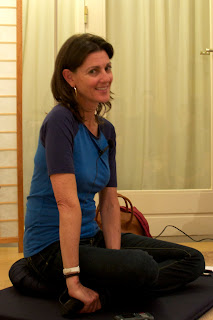 Last night we had an interview with Elizabeth Mattis-Namgyel at the Shambhala center in Amsterdam. Although not that many people attended, it was heartwarming that young students of different masters all came together: Shambhala, Rigpa, WakeUp and Dzogchen Community were represented.
Last night we had an interview with Elizabeth Mattis-Namgyel at the Shambhala center in Amsterdam. Although not that many people attended, it was heartwarming that young students of different masters all came together: Shambhala, Rigpa, WakeUp and Dzogchen Community were represented.With Rigpa Youth I've interviewed several lama's over the past two years and those have all been very cool and contained helpful advice for young practitioners. I thought this interview with Elizabeth would be just the same..
I had our list of questions and was curious for the fresh advice Elizabeth was going to offer us. But she did something even better: rather than just answering our questions, she engaged us in inquiry into our own questions. With shock I realised I hadn't really thought about these questions deeply myself, I was just waiting for teachers to answer them for me!
Elizabeth was saying that answers are static things but questions are always open and relating to things dynamically. When you think you have the answer, your mind shuts down and you're not receptive anymore. Asking an open question, enquiring in this way, is not searching for a static, fixed answer but keeping your mind open and engaged with whatever information comes from your life.
 One of the things that struck me is that she encouraged us, when we sit on our cushion, really to ask ourselves: "what am I doing? and why?" From what I understood, this doesn't mean the usual "why do i have to sit everday? it's challenging, boring, etc.." or to try to come up with the traditional explanation from the Buddhist teachings.
One of the things that struck me is that she encouraged us, when we sit on our cushion, really to ask ourselves: "what am I doing? and why?" From what I understood, this doesn't mean the usual "why do i have to sit everday? it's challenging, boring, etc.." or to try to come up with the traditional explanation from the Buddhist teachings.Rather, it's trying to find a way to explain to yourself, in your own language, what the Dharma is about. Making it really personal, rather than struggling to impose on yourself something external, with a lot of "shoulds and should nots".
What I took home with me
Shoulds and high ideals are some of my main obstacles. Lately, i'm stuggling with doing a daily practice. I intuit that this kind of enquiry is just the thing I need, because part of my resistance comes from feeling that Dharma practice is imposed on me, like a pressure or burden. I feel like I need to improve myself because i'm not good enough and also that I have a responsibility towards humanity and my teachers to practice and live up to the extraordinary teachings I've received. This sounds quite big and I think that's exactly the reason I feel intimidated by my cushion.
I'm hoping that through engaging in this kind of enquiry, i can make my understanding of the Dharma and my motivation for practice more personal and let go of some of these external pressures i'm putting on myself.
All in all, Elizabeth didn't give me any clear-cut answers, but she showed me how to engage with my questions myself, to relate the traditional teachings to my own life and make the Dharma more personally meaningful and enrich my spiritual path.
Thank you so much! :-)
We're working on a video edit but you can listen to the interview here (70 minutes, mp3)

Thank you Robert! Very very inspiring thoughts!Janna Velber, Rigpa, Cologne
ReplyDelete